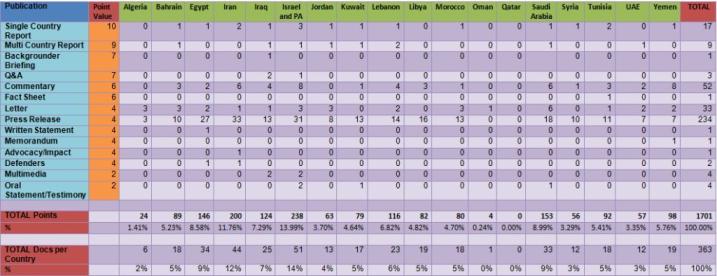HRW in 2010: More Bias, Even Less Credibility
Summary
- In 2010, as in previous years, Human Rights Watch’s Middle East and North Africa (MENA) division published more documents on “Israel and the Occupied Territories” than on any other country in the region. HRW produced 51 documents on “Israel and Occupied Territories,” followed by Iran (44), Egypt (34), Saudi Arabia (33), and Iraq (25).
- In 2010, journalists Benjamin Birnbaum (The New Republic) and Jonathan Foreman (Sunday Times [UK]) exposed HRW’s anti-Israel agenda, lack of credibility, and the ideological bias of HRW’s MENA staff. These publications reflected NGO Monitor’s detailed reports – see Experts or Ideologues: Systematic Analysis of Human Rights Watch (2009)
- HRW responded to the documented analysis and NGO Monitor’s requests for information by reducing transparency. In 2010, HRW removed their annual reports and the names of all employees, except for department heads, from its website.
- Systematic qualitative analysis by NGO Monitor demonstrates continued neglect of the most egregious and systematic abuses in closed societies (Saudi Arabia, Syria, Libya, Algeria, etc.). One of three major reports on Israel in 2010 consisted of166 pages, while ten years of research on human rights violations in Syria produced a 35-page report.
- HRW is heavily involved in the boycotts and sanctions campaigns targeting Israel, highlighting the politicized and biased agenda, as emphasized in the December 2010 publication “Separate and Unequal” – a title that falsely compared the conflict situation to the U.S. civil rights movement.
- MENA director Sarah Leah Whitson justified her meeting with the Hamas Minister of Justice as an effort “to listen to all parties directly so she will prepare more objective and impartial reports,” renewed her call for the Caterpillar boycott against Israel, and praised “the Lebanese sophistication for human rights.”
- In a November lecture, HRW founder Robert Bernstein expanded on his criticism of HRW for losing “critical perspective” on the Middle East conflict and “helping those who wish to turn Israel into a pariah state.” He noted that “little has changed” since the publication of his October 2009 op-ed in the New York Times.
Agenda Analysis: Israel remains major target; closed societies given less resources
Overview:
Since 2005, NGO Monitor has published quantitative analyses on the activities and publications of HRW’s Middle East and North Africa division (MENA). Comparing this data shows that the volume of HRW’s allegations directed at Israel are consistently and significantly above most other countries in the region. Periods characterized by major conflict (2006, 2009) lead to even greater disproportionality in the HRW condemnations of Israel, and these years are generally followed by a somewhat reduced emphasis on Israel, as was the case in 2007 and again in 2010 (see Appendix 1). The documents focusing on Israel continue to lead the HRW agenda for the region (see Table 1).
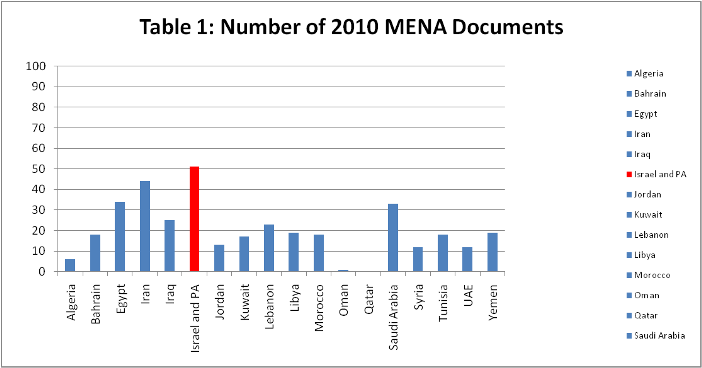
Detailed qualitative analysis of the content of HRW’s reports and press releases has also demonstrated a consisted ideological bias in the MENA division, and, as shown in the data, this continued in 2010. Under the direction of MENA director Sarah Leah Whitson, HRW places very limited emphasis on human rights violations in closed societies such as Saudi Arabia, Libya, Syria, Algeria, etc. In contrast, Whitson and deputy director Joe Stork have increased their involvement in BDS (boycotts, divestment, and sanctions) campaigns that target Israel.
Weighted Analysis — Disproportionate Focus on Israel
NGO Monitor employs a weighted methodology in analyzing the types of publications to reflect resource-consumption and relative impact (see Appendix 2). This analysis demonstrates that MENA focused the most resources on Israel (238 points), followed by Iran (200), Saudi Arabia (153), Egypt (146), Iraq (124), and Lebanon (116). (See Table 2 for an overview; Appendix 3 for full results.)
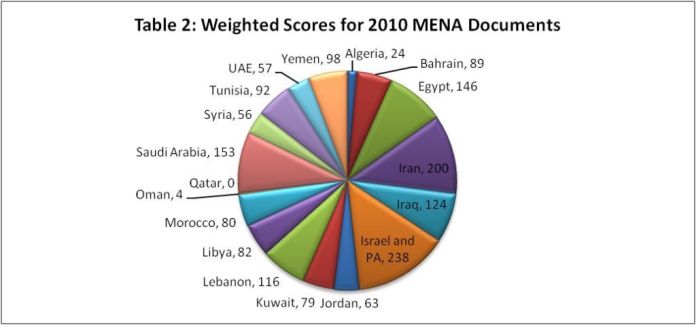
HRW publications on “Israel and the Occupied Territories” (HRW’s category) made up 14 percent of the total Mideast output in 2010. As noted, the 50 percent decrease (from 28 percent in 2009) reflects a reduction in armed violence in the region following the Gaza conflict, as well as reduced HRW lobbying on behalf of accusations made in the Goldstone Report, and increased external scrutiny of HRW by the media, NGO Monitor, and other experts.
Despite criticism of its biased agenda, including from HRW founder Robert Bernstein, the MENA division has not increased its relative de-emphasis on closed regimes where massive violations of human rights are a constant. Ten years of research on human rights violations in Syria produced a 35-page report; five years on Saudi Arabia resulted in a 52-page study (see below for substantive analysis of these reports). In contrast, HRW’s December 2010 report condemning Israel (“Separate and Unequal,”166 pages) is the longest report issued by MENA in the past two years (see below for detailed analysis). This disparity demonstrates the ongoing disproportionate allocation of research resources, and the intense over-emphasis on Israel.
In addition, HRW’s strategy of cursory publications on Syria, Libya, and Saudi Arabia contrast with the campaigns that target Israel, including the support for the Goldstone Report and recommendations. Similarly, in contrast to the narrow reports on Saudi Arabia, etc., HRW publications on Israel in 2010 covered a broad range of topics, including repeated accusations that Israel failed to adequately investigate the Gaza War and the “Free Gaza” flotilla incident. Other statements alleged discrimination against civil society, illegal demolition of Bedouin and Palestinian homes, and human rights violations in the West Bank and Gaza. A few documents noted Israel’s leadership in the Kimberly Process and in opposing “blood diamonds.”
In reports on Iran and Saudi Arabia, HRW focused on specific allegations of human rights abuses. In Iran, publications in 2010 dealt with post-election violence, and discrimination and violence against sexual minorities. Press releases addressed freedom of expression, women’s rights, religious freedom, sexual discrimination, and abuse of political prisoners. A number of statements condemned death penalty sentences.
Publications on Saudi Arabia dealt with domestic workers, political reform, individual instances of religious persecution, violations of freedom of expression and women’s and workers’ rights, and deportation of Somali migrants. The kingdom’s systematic violation of the most fundamental human rights was not a priority (see below for detailed analysis of HRW’s “soft approach” to Saudi Arabia).
HRW’s Ongoing Israel Obsession
As noted, HRW published more documents on Israel than on any other country in the MENA region, and the weighted analysis also demonstrated the primary focus on Israel. The number of items remained relatively constant throughout the year, with a minimum of two documents directed at Israel per month (see Table 3).
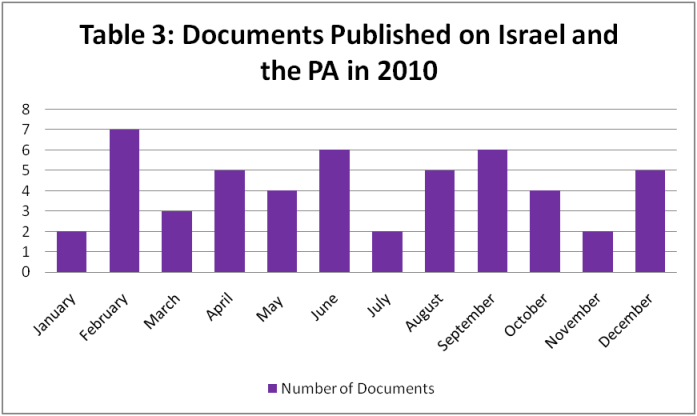
The majority of HRW documents on “Israel and the Occupied Territories” accuse Israel of human rights violations, while erasing the context of the conflict and the obligation of the Israeli government to protect its citizens from ongoing terror attacks. In 2010, HRW gave major attention to the alleged “inadequacy” of Israeli investigations into the Gaza War (14 of 51 documents) and the “Free Gaza” flotilla incident of May 2010 as part of the wider NGO campaign to discredit the Israeli justice system.
HRW also issued at least one document per month on Iran and Saudi Arabia (see Table 4).
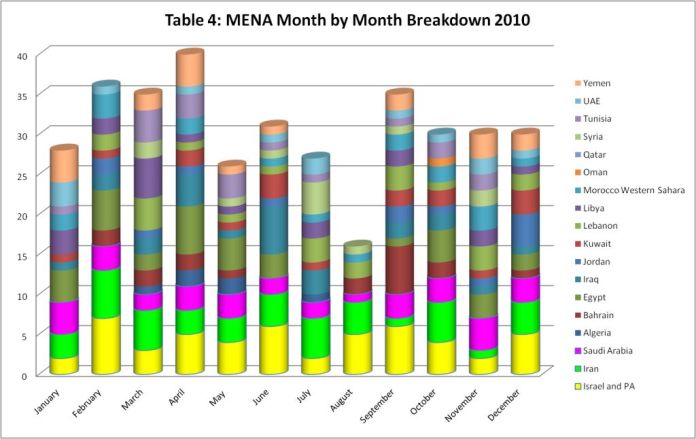
In 2010, HRW issued three major publications on Israel – more than on any other Middle Eastern country. Two of the reports, “I Lost Everything” (May 13, 2010) and “Turning a Blind Eye” (April 10, 2010) contained additional allegations from the December 2008-January 2009 Gaza War (in addition to five HRW reports on the Gaza War in 2009).
The third report, “Separate and Unequal” (December 19, 2010), falsely accuses Israel of discrimination against Palestinians in the West Bank on the “basis of race, ethnicity, and national origin.” In it, HRW repeats previous demands of the U.S. government to sanction Israel by withholding security assistance “in an amount equivalent to [Israel’s] expenditures on settlements and related infrastructure in the West Bank.” These three reports were characterized by faulty methodology, reliance on unconfirmed NGO sources, and misrepresentations of international law.
HRW also increased its support for the BDS (boycotts, divestment, and sanctions) campaigns against Israel. At the news conference announcing the May 2010 “‘I Lost Everything’” report on the Gaza War, Sarah Leah Whitson renewed her call for the Caterpillar bulldozer boycott, which had been made in 2004 based on HRW’s “Razing Rafah” publication. Similarly, the “Separate and Unequal” report calls on corporations to sever ties with projects or companies in Israeli settlements. HRW MENA researcher Bill Van Esveld acknowledged HRW’s role in the campaign to delegitimize Israel: “It would be disingenuous for us to say it [“Separate and Unequal” report] has no similarities to BDS. This is kind of an S report” (referring to the S in BDS).
MENA’s anti-Israel bias was also seen on issues beyond the Arab-Israeli conflict. In 2010, HRW devoted a number of reports to the human rights abuse of migrant workers: “Walls at Every Turn” (October 6, 2010) examined extortion and sexual exploitation of migrant workers in Kuwait; “Slow Reform” (April 27, 2010) addressed the worldwide problem of violations against migrants, with an emphasis on Arab countries such as Saudi Arabia, Jordan, and the United Arab Emirates. “Rights on the Line” (December 11, 2010) again discussed the abuse of migrant workers internationally. However, when MENA researcher Bill Van Esveld wrote an op-ed about the topic, his article was entitled “Israel should Respect Rights of Migrant Workers” (Global Post, October 8, 2010), and did not mention other countries. Van Esveld’s two other op-eds in 2010 also dealt with the Arab-Israeli conflict.
HRW documents on Palestinian Authority and Hamas
Although HRW’s categories do not distinguish between Israel, the Palestinian Authority, and Hamas, NGO Monitor analysis shows that 13 of 51 (25%) documents on “Israel and the Occupied Territories” were directed primarily to the Palestinian Authority or Hamas. This constitutes a very small proportion, particularly considering the role of Hamas as a terrorist organization that commits major and systematic human rights violations targeting both Israelis and Palestinians.
In May 2010, HRW met with Hamas Minister of Justice Faraj al-Ghoul and other government officials, ostensibly to request permission to visit detainees in Gaza’s central prison. According to Hamas, at the meeting Whitson assured Alghoul that she was visiting Gaza “to listen to all parties directly so she will prepare more objective and impartial reports,” and appeased Hamas officials by promising that HRW’s next report would tackle Israeli settlements and allege Israeli violations of international law.
HRW’s bias was also seen in its approach to foreign aid. While demanding that the U.S. sanction Israel by “withholding [] funding from the Israeli government,” in response to the detention of a Palestinian blogger, HRW weakly stated, “Foreign donors should be asking the PA why it is allocating resources to arbitrarily detain a man for peacefully expressing his views.” In contrast to demands for anti-Israel sanctions, HRW repeatedly called for an end to the economic sanctioning of Hamas (which HRW refers to as “collective punishment”).
HRW’s statements in 2010 sporadically and belatedly condemned executions carried out by Hamas, the arbitrary closure of NGO offices in Gaza, and torture by PA Security Services. A press release (December 5, 2010) calling on the PA to free a detained blogger was only issued one month after his arrest, and following growing international pressure.
In addition, on June 25, 2010, HRW released a statement marking the fourth year of kidnapped Israeli soldier Gilad Shalit’s captivity. Although HRW accuses Hamas of “cruel and inhuman [that] may amount to torture,” the press release immorally compares Hamas’ detention of Shalit with Israel’s policies toward Palestinian detainees. As part of its political agenda, HRW continued to invoke international legal rhetoric such as including accusations that Israel was responsible for “unlawful collective punishment against Gaza’s civilians.”
Open vs. Closed Societies
The disparity in scope and harshness between reports on Israel versus abusive regimes in the Mideast is symptomatic of the differences in HRW’s approach to open and closed societies. HRW’s disproportionate coverage of Israel reflects the organization’s ideological bias that understates the chronic abuses of closed societies, while simultaneously targeting Israel – the only democratic country in the Middle East. This approach belies the universality of human rights and contributes to the global anti-Israel de-legitimization agenda.
Closed societies such as Saudi Arabia and Syria prevent access from without and criticism from within, limiting HRW’s ability to probe systematic human rights abuses. In contrast, the open and democratic nature of Israel enables HRW’s obsessive criticism and advocacy.
MENA’s soft approach to closed societies is clearly illustrated in “Looser Rein, Uncertain Gain,” HRW’s assessment of five years of reform in Saudi Arabia. The report downplays the most egregious examples of Saudi Arabia’s systematic abuse of human rights, such as the absence of sexual freedom, corruption and lack of government transparency, and religious persecution, and makes amorphous recommendations without concrete guidelines for implementation.
However, it is interesting to note that HRW officials outside MENA do not share the weak agenda on Saudi Arabia. In December 2010, HRW’s Deputy Washington Director Maria McFarland briefed the US House of Representatives on the subject of religious freedom in Saudi Arabia, describing a reality of severe religious repression, and systematic discrimination and persecution on the basis of religion. She also criticized U.S. inaction: “If the United States is serious about promoting religious tolerance in Saudi Arabia, it cannot remain content to publish a report once a year about religious repression or to praise Saudi Arabia for symbolic commitments to religious tolerance.” Ironically, MacFarland’s description of inadequate U.S. attention to Saudi Arabian abuses aptly applies to MENA’s work on Saudi Arabia.
HRW’s strategy of developing ties with totalitarian regimes, rather than combating serious human rights abuses, is led by MENA director Sarah Leah Whitson. Her influence in advancing this approach is evidenced in an op-ed she wrote following her visit to Libya (“Postcard from . . . Tripoli,” Foreign Policy in Focus, Feb 11, 2010). Although HRW’s Libyan press conference was cut short by government agents and ended in “pandemonium,” Whitson spun her trip and the event in an entirely positive light.
Whitson also met with Hamas Minister of Justice Faraj Alghoul in May 2010. At the meeting, Whitson assured Alghoul that she was visiting Gaza “to listen to all parties directly so she will prepare more objective and impartial reports,” and appeased Hamas by promising that HRW’s next report would tackle Israeli settlements and allege Israeli violations of international law.
At the end of November 2010, HRW staff and international committee members, including Whitson, traveled to Lebanon to discuss human rights reform in the country. Whitson praised “the Lebanese sophistication for human rights.” But, HRW Lebanon Director Nadim Houry condemned the lack of effectual and accountable state institutions, the absence of political will to implement change, and the problems created by the country’s political confessionalism.
In some instances, MENA does not report at all on violations in certain closed societies. For instance, HRW does not cover Mauritania, a North African country where it is estimated that more than 600,000 people are enslaved. HRW’s only publication documenting the repression of Mauritania’s black population by Arab rulers dates back to 1994.
HRW Hides from Media Criticism
In 2010, HRW demonstrated a continuing lack of credibility on Arab-Israeli issues. This was demonstrated in 2010 by journalists Benjamin Birnbaum and Jonathan Foreman, who published detailed research exposing HRW’s disproportionate focus on Israel, inconsistencies and lack of reliability in the organization’s research, and the ideological bias of HRW’s Middle East staff. The details presented in their articles reinforced NGO Monitor’s systematic research on these problems – see Experts or Ideologues: Systematic Analysis of Human Rights Watch (2009).
HRW responded to this documented analysis and NGO Monitor’s requests for information on the professional qualifications of various “researchers” by reducing transparency. In 2010, HRW removed their annual reports and the names of all employees, except for department heads, from its website.
Foreman’s “Nazi Scandal engulfs Human Rights Watch” (Sunday Times [UK], March 28, 2010) illustrated how the revelation of HRW “senior military analyst” Marc Garlasco’s Nazi memorabilia obsession was indicative of far deeper problems at the organization. The following excerpts from the article shed light on the MENA division:
- I interviewed a human-rights expert at a competing organisation in Washington… He told me he was “not surprised” that HRW has still not produced a report on the violence in Iran: “Their hearts are not in it. Let’s face it, the thing that really excites them is Israel.”
- Associates of Garlasco have told me that there had long been tensions between Garlasco and HRW’s Middle East Division in New York – perhaps because he sometimes stuck his neck out and did not follow the HRW line. Garlasco himself apparently resented what he felt was pressure to sex up claims of Israeli violations of laws of war in Gaza and Lebanon, or to stick by initial assessments even when they turned out to be incorrect.
- “While it may be hard to find people who are genuinely neutral about Middle East politics, theoretically an organisation like HRW would not select as its researchers people who are so evidently on one side.
On April 4, 2010, the Sunday Times published HRW’s response, which simply repeated claims that their coverage of other human rights abuses and conflicts is broader than the article implied. The correction, however, avoided the main issues such as credibility, bias against Israel, and the Garlasco gag order.
Birnbaum’s April 27, 2010 article in The New Republic, “Minority Report: Human Rights Watch fights a civil war over Israel,” similarly highlighted the deeply-rooted bias among senior HRW officials, in contradistinction to human rights principles. Excerpts from Birnbaum’s interviews with HRW staff and former HRW board members revealed the deeply rooted bias in the MENA division:
- MENA director Sarah Leah Whitson “definitely has no sympathy for the Israeli side… And she does, I think, have a lot of personal identification with the Palestinian cause,” according to a colleague.
- “It seemed to me that there was a commitment to a point of view—that Israel’s the bad guy here.
- “We seek the limelight—that’s part of what we do. And so, Israel’s sort of like low-hanging fruit.”
- “An organization that was founded to protect the most basic of human rights—freedom of speech… seems to have created within its own organization a disregard and intolerance for open dialogue.”
HRW board member emeritus and co-chair of the MENA committee Kathleen Peratis responded to the TNR article, repeating the claim (without evidence) that “There is no bias against Israel at Human Rights Watch except in the minds of those who erroneously believe Israel is harmed by honest criticism. Far from harming it, I believe this work strengthens Israel.” Peratis’ broad claim does not address any of the substantive questions about HRW’s bias and lack of credibility raised by Birnbaum, NGO Monitor, and others.
(For more details, see NGO Monitor’s analyses of the TNR and Sunday Times articles.)
Bernstein’s Continued Criticism of HRW
On November 10, 2010, HRW founder Robert Bernstein expanded his criticism of HRW at the Goldstein Lecture on Human Rights at the University of Nebraska at Omaha. He demonstrated that HRW and other human rights organizations are leading a political war against Israel by working closely with corrupt UN frameworks. Excerpts from the speech:
- “HRW and others have taken positions on the Wall, the borders, and the occupation, so it is hard to separate human rights issues from political issues… in their attempts to do what they think is evenhanded, they fail to recognize the virtues of nations that have had considerable success in making the Universal Declaration of Human Rights truly universal.”
- “HRW has been, by far, the biggest supporter of the UN Council, urging them to bring war crimes allegations against Israel – based on this [the Goldstone] report.”
- “I don’t believe HRW has responded to many responsible analyses challenging the war crimes accusations made by Goldstone and also challenging HRW’s own reports…”
- “the UN Human Rights [Council]… got the idea that they could get prominent Jews known for their anti-Israel views to head their investigations. Even before Richard Goldstone, they appointed Richard Falk… to be the UN rapporteur for the West Bank and Gaza. Richard Falk had written an article comparing Israel’s treatment of Palestinians in the West Bank and Gaza to Hitler’s treatment of the Jews in the Holocaust. Israel… would not allow him into the country. HRW leapt to his defense, putting out a press release comparing Israel with North Korea and Burma in not cooperating with the UN… the release was written by Joe Stork – Deputy Director of Human Rights Watch Middle East Division – whose previous job for many, many years, was as an editor of a pro-Palestinian newsletter.”
HRW’s Donors Respond
According to HRW’s Financial Statements, the organization lost $6 million in donor support in 2010. This can be attributed in part to responses to the May 2009 fundraising trip to Saudi Arabia and the revelation that HRW “senior military analyst” Marc Garlasco was an avid collector of Nazi memorabilia.
However, this loss was mitigated by a 10-year, $100 million donation from billionaire George Soros. The grant is the largest that Soros has ever made to an NGO. With the grant, HRW announced plans to increase its staff by one-third and “to shape the foreign policies of these emerging powers, much as we have traditionally done with Western powers.” While Soros’ gift will alleviate HRW’s declining income, it will not restore the NGO’s credibility on Israel.
HRW also altered the language on the “Financials” page of its website to reflect heightened scrutiny of its donors. In 2009, NGO Monitor revealed that Oxfam Novib, one of HRW’s major donors ($987,818 in 2007-8), annually receives nearly €130 million from the Dutch government. Subsequently, HRW added the claim that “Some foundations that support Human Rights Watch are partially funded by governments; we accept no government funds from these foundations, only privately sourced revenues.” HRW’s assertion cannot be independently verified, and given that the Netherlands provides over 70 percent of Oxfam Novib’s annual budget, it appears unlikely. (Numbers for 2009-2010 cannot be verified because HRW has not published the full version of their financial statements online.)
Additionally, a press release announcing the launch of its first Middle East Committee in Beirut (“Lebanon: Human Rights Watch Launches First Middle East Committee in Beirut,” December 6, 2010) also emphasized that the organization was “supported by contributions from private individuals and foundations worldwide. It accepts no government funds, directly or indirectly.”
HRW’s New Chair
In October 2010, James Hoge Jr. became the chair of HRW’s board, replacing Jane Olsen. As the longtime editor of Foreign Affairs, Hoge’s essays included the “Tiananmen Papers,” covering the brutal response of the Chinese government to the 1989 protests. It was hoped that under the new chair, HRW would devote more resources to substantively addressing severe, global cases of human rights abuses. (See NGO Monitor’s open letter, calling on Hoge to restore HRW’s moral leadership.)
Conclusion
For the past decade, HRW has played a major role in the destruction of the moral and universal foundations of human rights, and the exploitation of these principles for ideological objectives, particularly in the MENA division. The leaders of this organization have systematically ignored the criticism of these practices and abuses, and expanded their disproportionate attacks on democracies in general, and Israel in particular.
In November 2010, HRW founder Robert Bernstein delivered the Goldstein Lecture on Human Rights at the University of Nebraska at Omaha, in which he severely criticized HRW’s role in targeting Israel as one of the “principal offenders” of human rights. Bernstein call on HRW to return to its “founding mission and the spirit of humility that animated it.”
Perhaps under the leadership of James Hoge Jr., HRW will put its house in order, beginning with necessary changes at MENA. Without such changes, the organization will continue to fail those who most need the human rights advocates.
Appendix 1
HRW Emphasis on “Israel and Occupied Territories” 2005 – 2010
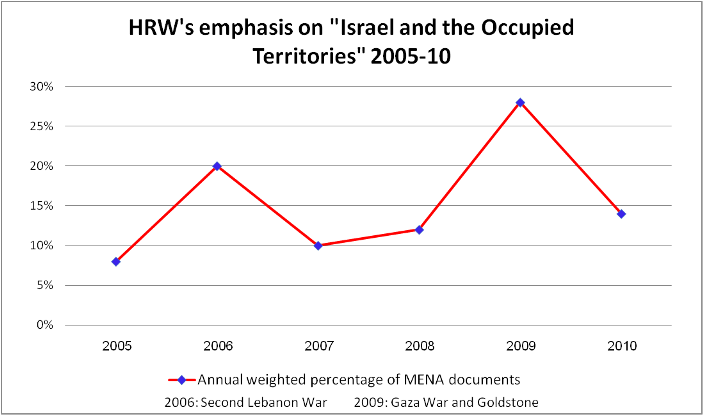
Appendix 2
Measure of Effort
The weighted values used in this report were calculated via the point system described below.
Points were allocated based on the level of resources required for HRW to publish that type of document, and the expected impact of that item.

